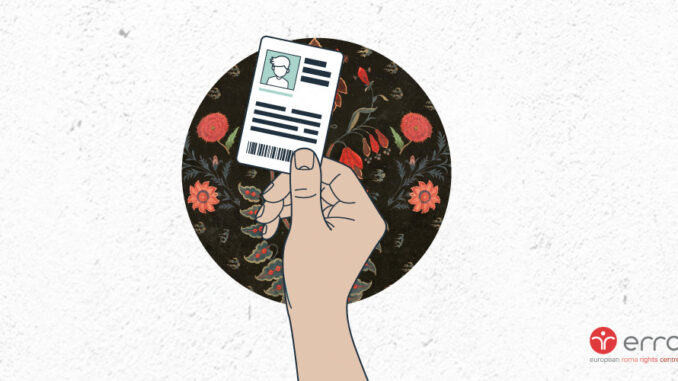
The European Roma Rights Centre (ERRC) acknowledges recent legislative moves by the North Macedonian government to address statelessness, but remains concerned about how effectively the new laws concerning residence and birth registration, personal identification cards, and citizenship status will be implemented with regards to Roma at risk of statelessness.
| Källa: ERRC |
The amendments to the Law on Registration of Residence and the Law on Citizenship, and the Laws on Identification Documents and on Civil Registry, will need to be monitored closely if they are to succeed.
In recent years, legislative regulations and provisions related to birth registration, and residence registration, personal identification cards, and citizenship status have made many individuals practically invisible in North Macedonia. The situation mainly concerns Romani citizens who have difficulties proving their place and time of birth, often lack personal identification cards, reside in informal settlements or structures, or are homeless without fixed addresses. As a consequence, many have been unable to establish legal relations with institutions, and denied fundamental rights and freedoms such as health insurance, social protection, education, employment, and housing.
Challenges in addressing statelessness in North Macedonia may include the absence of comprehensive and ethnically disaggregated data on stateless individuals, and insufficient identification procedures. Stateless individuals might not have registered due to limited awareness, inability to meet registration requirements, or fear of detention without proper documentation. Therefore, it is strongly recommended to enhance data collection and monitoring and mechanisms that eliminate discriminatory laws and practices to ensure stateless individuals can exercise their fundamental rights and access all essential services without discrimination.
Regarding statelessness in migratory context, North Macedonia does not have a statelessness determination procedure or protection status. This limitation restricts the options available for stateless individuals to seek asylum or obtain temporary residence permits. It is crucial for the state to ensure that all stateless people, including Roma, have access to fundamental rights in law and in practice without any discrimination, irrespective of documentation or citizenship status, including primary and secondary education, healthcare, specifically reproductive rights and maternity care for women, work, accommodation, and freedom from violations of rights such as child and early marriage.
“For far too long, stateless Roma, and Roma at risk of statelessness have led precarious and invisible lives, unable to access basic services and fundamental rights” said the ERRC’s President, Đorđe Jovanović, “These legislative reforms are to be welcomed. But the proof will lie in the implementation, and close monitoring will be needed to ensure that the system works to protect the most vulnerable Roma from all forms of discrimination.”
The ERRC in collaboration with The Macedonian Young Lawyers Association (MYLA), the Institute on Statelessness and Inclusion (ISI) and the European Network on Statelessness (ENS), submitted a joint Universal Periodic Review (UPR) report on 11 October 2023 concerning North Macedonia. This report focuses on the issue of statelessness and showcases the dedication and commitment of the organisations to address this crucial concern. Statelessness is an issue that affects the lives of countless individuals, denying them fundamental rights and opportunities. The UPR report aims to raise awareness, advocate for change, and encourage action to address the challenges faced by stateless individuals in North Macedonia. The report includes comprehensive research findings, insightful analysis and recommendations to tackle the issue of statelessness. By submitting this joint UPR report, the organisations aim to draw attention to the urgency of the situation and encourage meaningful discussions and actions at both national and international levels.
On 29 August 2023, the Commission for Prevention and Protection Against Discrimination in North Macedonia has found that the Ministry of Interior indirectly discriminated against Roma living in informal communities by preventing them from obtaining identity cards. This discrimination has led to difficulties in accessing healthcare and social services, as demonstrated by the death of a young Romani man, Memet Kamber. The European Roma Rights Centre has brought a complaint, and the Commission has recommended amending the law to ensure equal access to rights for Roma in informal housing. On 16 October, the Commission for the Prevention and Protection against Discrimination welcomed the changes to the Residence and Domicile Registration Law and the Law on Identification Documents.
The amendments, adopted by Parliament on 5 October 2023, to the laws on Registration of Residence and on Identification Documents, have introduced a simplified procedure for homeless people to register their residence at the addresses of social work centres. People who are accommodated in a health or social institution can register their address as that of the respective institution. Additionally, the new amendments foresee several options for people living in ‘non-legalised houses’ to document ownership of the property and obtain an identity document. Homeless individuals can provide biometric data when applying for a personal identification card in the presence of an official from the Social Welfare Centre. The Law on Civil Registration also ensures that every child born in North Macedonia is registered within 45 days of birth, regardless of their parent’s citizenship or personal status.
This press release is also available in Macedonian.
redaktionen@dikko.nu
Att vara en oberoende tidning kostar pengar så vill du hjälpa oss med att betala vårt fika får du gärna swisha en slant till 123 242 83 40 eller bg: 5534-0046
Vill du annonsera eller sponsra, synas eller höras i våra media?
Kontakta oss på redaktionen@dikko.nu
eller ring 0768 44 51 61
IBAN: SE19 9500 0099 6042 1813 4395
BIC: NDEASESS




